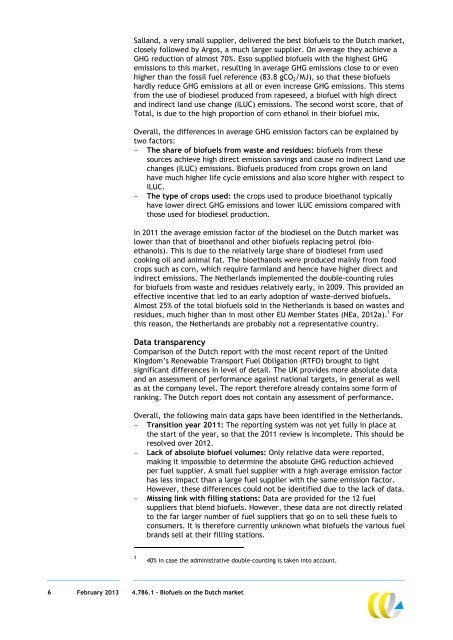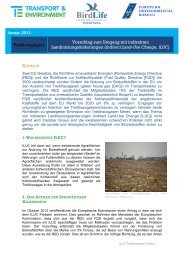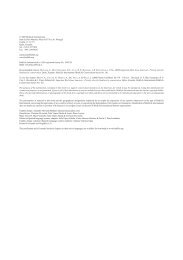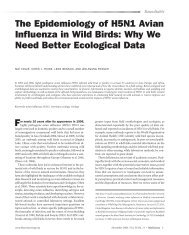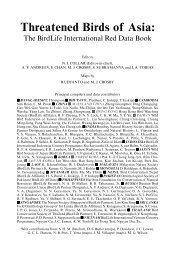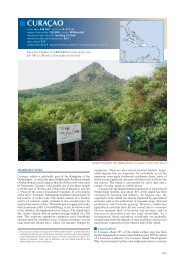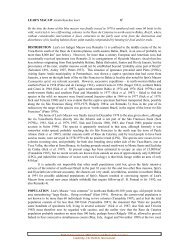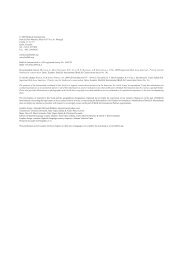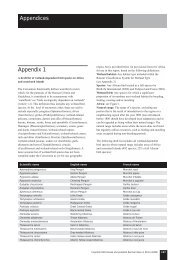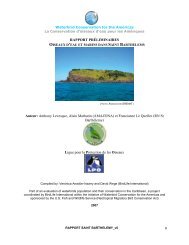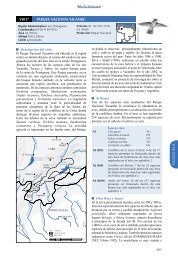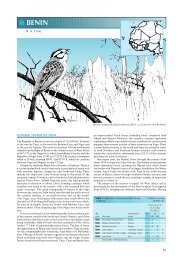Biofuels on the Dutch market - BirdLife International
Biofuels on the Dutch market - BirdLife International
Biofuels on the Dutch market - BirdLife International
Create successful ePaper yourself
Turn your PDF publications into a flip-book with our unique Google optimized e-Paper software.
Salland, a very small supplier, delivered <strong>the</strong> best biofuels to <strong>the</strong> <strong>Dutch</strong> <strong>market</strong>,<br />
closely followed by Argos, a much larger supplier. On average <strong>the</strong>y achieve a<br />
GHG reducti<strong>on</strong> of almost 70%. Esso supplied biofuels with <strong>the</strong> highest GHG<br />
emissi<strong>on</strong>s to this <strong>market</strong>, resulting in average GHG emissi<strong>on</strong>s close to or even<br />
higher than <strong>the</strong> fossil fuel reference (83.8 gCO 2 /MJ), so that <strong>the</strong>se biofuels<br />
hardly reduce GHG emissi<strong>on</strong>s at all or even increase GHG emissi<strong>on</strong>s. This stems<br />
from <strong>the</strong> use of biodiesel produced from rapeseed, a biofuel with high direct<br />
and indirect land use change (ILUC) emissi<strong>on</strong>s. The sec<strong>on</strong>d worst score, that of<br />
Total, is due to <strong>the</strong> high proporti<strong>on</strong> of corn ethanol in <strong>the</strong>ir biofuel mix.<br />
Overall, <strong>the</strong> differences in average GHG emissi<strong>on</strong> factors can be explained by<br />
two factors:<br />
The share of biofuels from waste and residues: biofuels from <strong>the</strong>se<br />
sources achieve high direct emissi<strong>on</strong> savings and cause no indirect Land use<br />
changes (ILUC) emissi<strong>on</strong>s. <str<strong>on</strong>g>Biofuels</str<strong>on</strong>g> produced from crops grown <strong>on</strong> land<br />
have much higher life cycle emissi<strong>on</strong>s and also score higher with respect to<br />
ILUC.<br />
The type of crops used: <strong>the</strong> crops used to produce bioethanol typically<br />
have lower direct GHG emissi<strong>on</strong>s and lower ILUC emissi<strong>on</strong>s compared with<br />
those used for biodiesel producti<strong>on</strong>.<br />
In 2011 <strong>the</strong> average emissi<strong>on</strong> factor of <strong>the</strong> biodiesel <strong>on</strong> <strong>the</strong> <strong>Dutch</strong> <strong>market</strong> was<br />
lower than that of bioethanol and o<strong>the</strong>r biofuels replacing petrol (bioethanols).<br />
This is due to <strong>the</strong> relatively large share of biodiesel from used<br />
cooking oil and animal fat. The bioethanols were produced mainly from food<br />
crops such as corn, which require farmland and hence have higher direct and<br />
indirect emissi<strong>on</strong>s. The Ne<strong>the</strong>rlands implemented <strong>the</strong> double-counting rules<br />
for biofuels from waste and residues relatively early, in 2009. This provided an<br />
effective incentive that led to an early adopti<strong>on</strong> of waste-derived biofuels.<br />
Almost 25% of <strong>the</strong> total biofuels sold in <strong>the</strong> Ne<strong>the</strong>rlands is based <strong>on</strong> wastes and<br />
residues, much higher than in most o<strong>the</strong>r EU Member States (NEa, 2012a). 1 For<br />
this reas<strong>on</strong>, <strong>the</strong> Ne<strong>the</strong>rlands are probably not a representative country.<br />
Data transparency<br />
Comparis<strong>on</strong> of <strong>the</strong> <strong>Dutch</strong> report with <strong>the</strong> most recent report of <strong>the</strong> United<br />
Kingdom’s Renewable Transport Fuel Obligati<strong>on</strong> (RTFO) brought to light<br />
significant differences in level of detail. The UK provides more absolute data<br />
and an assessment of performance against nati<strong>on</strong>al targets, in general as well<br />
as at <strong>the</strong> company level. The report <strong>the</strong>refore already c<strong>on</strong>tains some form of<br />
ranking. The <strong>Dutch</strong> report does not c<strong>on</strong>tain any assessment of performance.<br />
Overall, <strong>the</strong> following main data gaps have been identified in <strong>the</strong> Ne<strong>the</strong>rlands.<br />
Transiti<strong>on</strong> year 2011: The reporting system was not yet fully in place at<br />
<strong>the</strong> start of <strong>the</strong> year, so that <strong>the</strong> 2011 review is incomplete. This should be<br />
resolved over 2012.<br />
Lack of absolute biofuel volumes: Only relative data were reported,<br />
making it impossible to determine <strong>the</strong> absolute GHG reducti<strong>on</strong> achieved<br />
per fuel supplier. A small fuel supplier with a high average emissi<strong>on</strong> factor<br />
has less impact than a large fuel supplier with <strong>the</strong> same emissi<strong>on</strong> factor.<br />
However, <strong>the</strong>se differences could not be identified due to <strong>the</strong> lack of data.<br />
Missing link with filling stati<strong>on</strong>s: Data are provided for <strong>the</strong> 12 fuel<br />
suppliers that blend biofuels. However, <strong>the</strong>se data are not directly related<br />
to <strong>the</strong> far larger number of fuel suppliers that go <strong>on</strong> to sell <strong>the</strong>se fuels to<br />
c<strong>on</strong>sumers. It is <strong>the</strong>refore currently unknown what biofuels <strong>the</strong> various fuel<br />
brands sell at <strong>the</strong>ir filling stati<strong>on</strong>s.<br />
1<br />
40% in case <strong>the</strong> administrative double-counting is taken into account.<br />
6 February 2013 4.786.1 - <str<strong>on</strong>g>Biofuels</str<strong>on</strong>g> <strong>on</strong> <strong>the</strong> <strong>Dutch</strong> <strong>market</strong>


